Faculty Guide: Mastering Time Management for Enhanced Productivity
VerifiedAdded on 2020/09/08
|34
|6759
|373
Report
AI Summary
This faculty guide provides a comprehensive overview of time management principles and practices. It begins with an icebreaker exercise and then delves into the definition and importance of time management, emphasizing its role in increasing efficiency, effectiveness, and productivity. The guide explores common misconceptions about time management and identifies characteristics of ineffective time managers. It then covers key aspects like goal setting, prioritization, and managing interruptions and procrastination. The guide includes practical activities, discussion prompts, and self-assessment tools to help faculty members implement effective time management strategies, improve organizational skills, and achieve a better work-life balance. The guide aims to equip faculty with the knowledge and tools to work smarter, not harder, and ultimately enhance their overall performance and satisfaction.
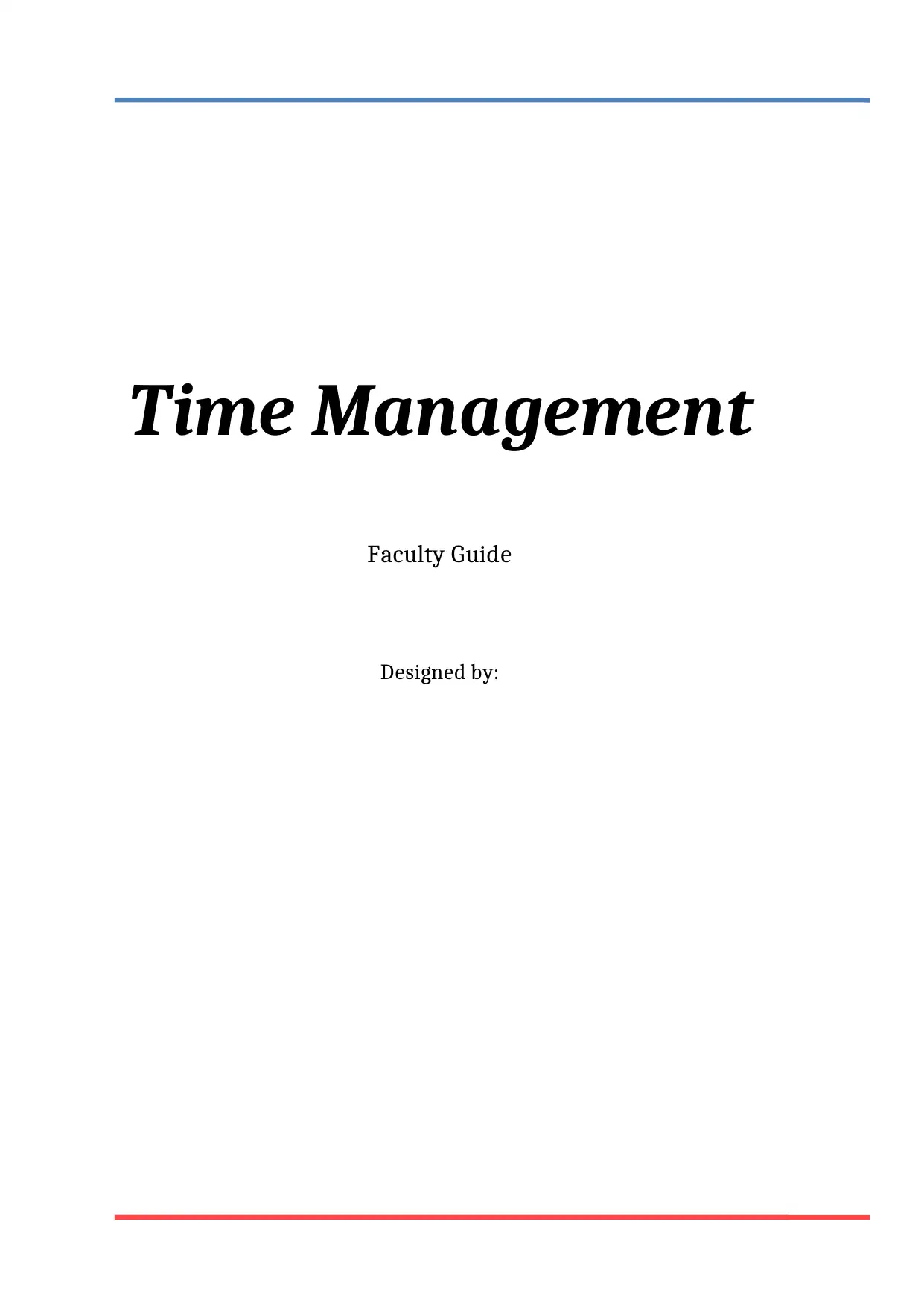
Time Management
Faculty Guide
Designed by:
Faculty Guide
Designed by:
Paraphrase This Document
Need a fresh take? Get an instant paraphrase of this document with our AI Paraphraser
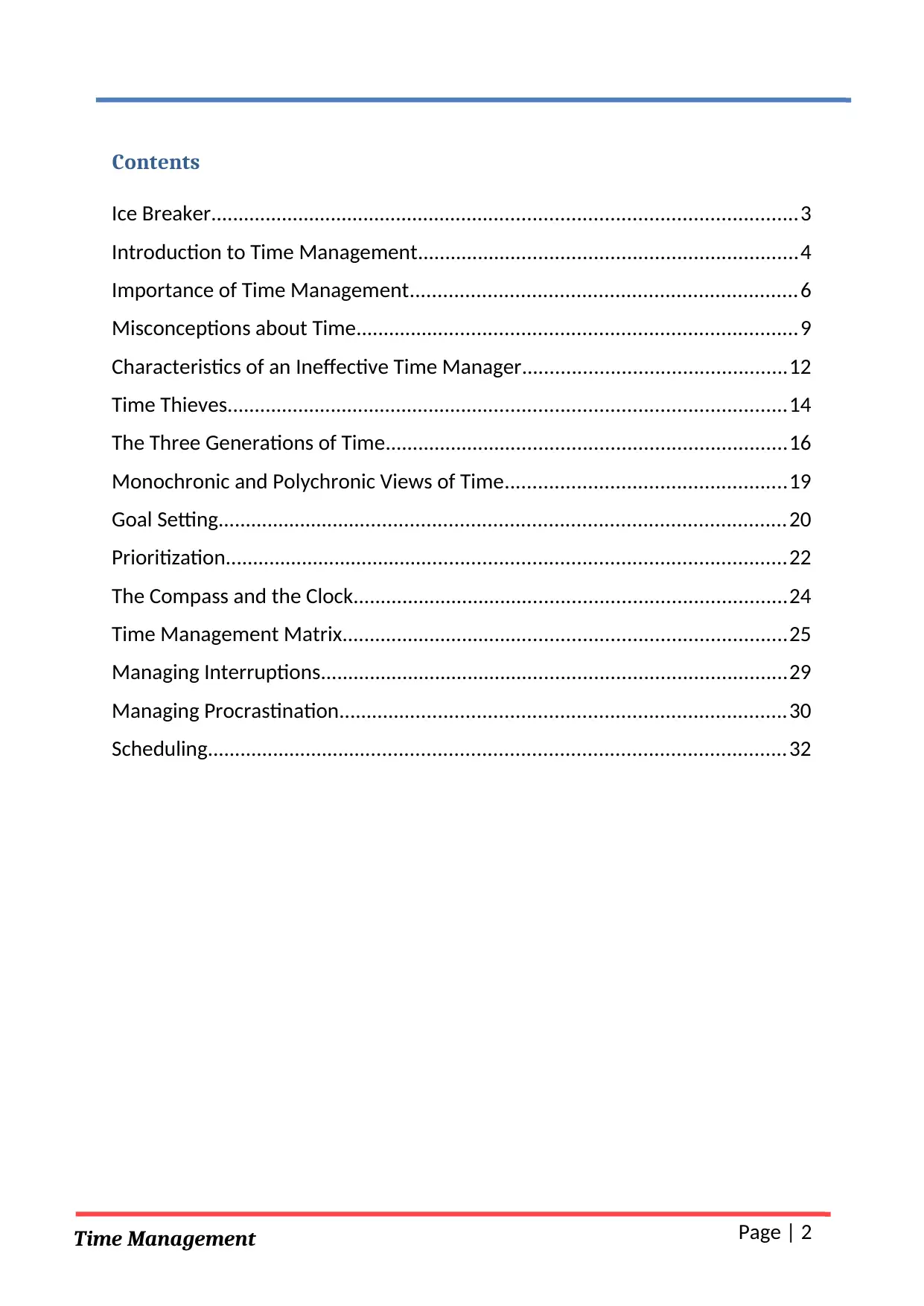
Time Management
Contents
Ice Breaker...........................................................................................................3
Introduction to Time Management.....................................................................4
Importance of Time Management......................................................................6
Misconceptions about Time................................................................................9
Characteristics of an Ineffective Time Manager................................................12
Time Thieves......................................................................................................14
The Three Generations of Time.........................................................................16
Monochronic and Polychronic Views of Time...................................................19
Goal Setting.......................................................................................................20
Prioritization......................................................................................................22
The Compass and the Clock...............................................................................24
Time Management Matrix.................................................................................25
Managing Interruptions.....................................................................................29
Managing Procrastination.................................................................................30
Scheduling.........................................................................................................32
Page | 2
Contents
Ice Breaker...........................................................................................................3
Introduction to Time Management.....................................................................4
Importance of Time Management......................................................................6
Misconceptions about Time................................................................................9
Characteristics of an Ineffective Time Manager................................................12
Time Thieves......................................................................................................14
The Three Generations of Time.........................................................................16
Monochronic and Polychronic Views of Time...................................................19
Goal Setting.......................................................................................................20
Prioritization......................................................................................................22
The Compass and the Clock...............................................................................24
Time Management Matrix.................................................................................25
Managing Interruptions.....................................................................................29
Managing Procrastination.................................................................................30
Scheduling.........................................................................................................32
Page | 2
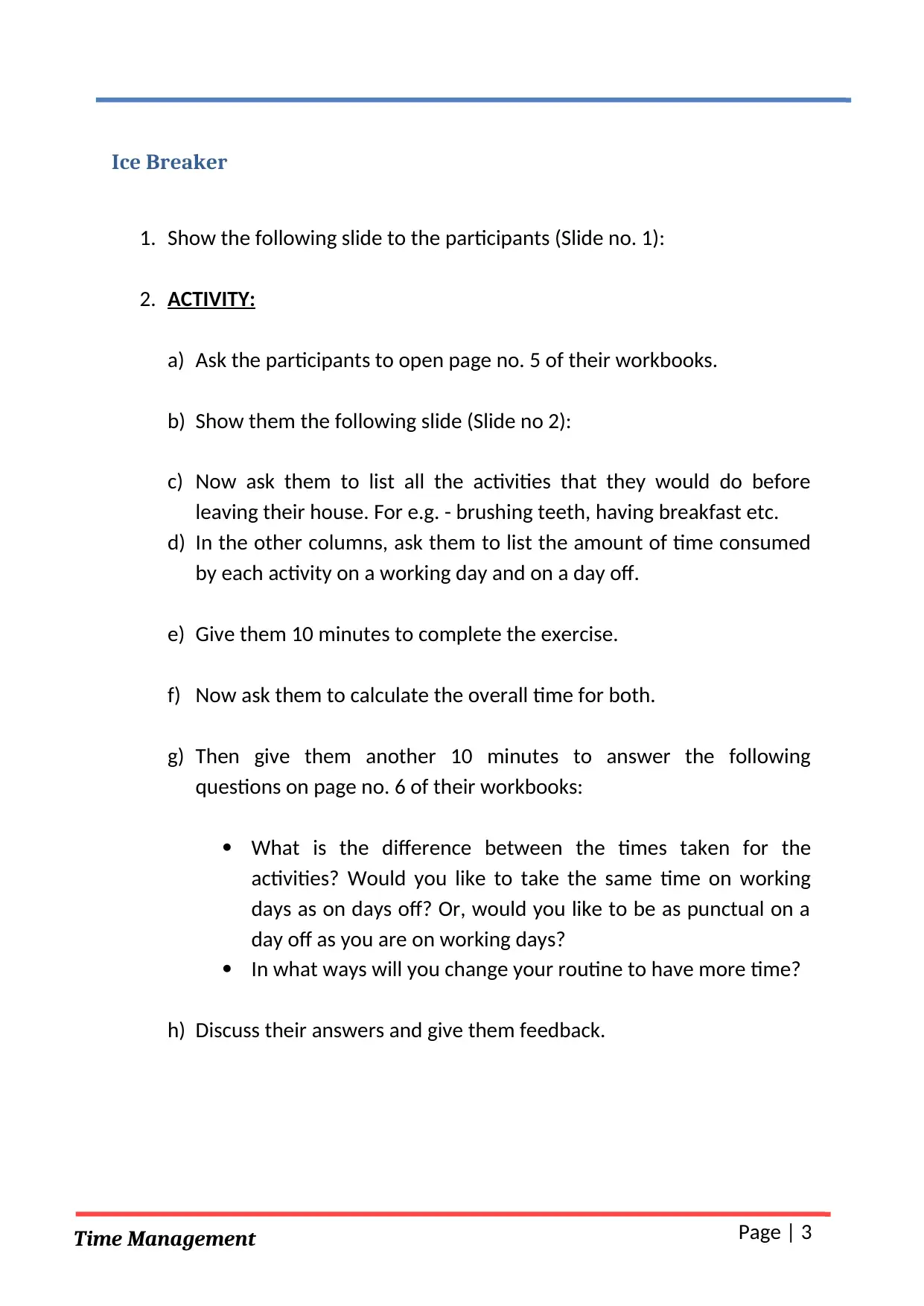
Time Management
Ice Breaker
1. Show the following slide to the participants (Slide no. 1):
2. ACTIVITY:
a) Ask the participants to open page no. 5 of their workbooks.
b) Show them the following slide (Slide no 2):
c) Now ask them to list all the activities that they would do before
leaving their house. For e.g. - brushing teeth, having breakfast etc.
d) In the other columns, ask them to list the amount of time consumed
by each activity on a working day and on a day off.
e) Give them 10 minutes to complete the exercise.
f) Now ask them to calculate the overall time for both.
g) Then give them another 10 minutes to answer the following
questions on page no. 6 of their workbooks:
What is the difference between the times taken for the
activities? Would you like to take the same time on working
days as on days off? Or, would you like to be as punctual on a
day off as you are on working days?
In what ways will you change your routine to have more time?
h) Discuss their answers and give them feedback.
Page | 3
Ice Breaker
1. Show the following slide to the participants (Slide no. 1):
2. ACTIVITY:
a) Ask the participants to open page no. 5 of their workbooks.
b) Show them the following slide (Slide no 2):
c) Now ask them to list all the activities that they would do before
leaving their house. For e.g. - brushing teeth, having breakfast etc.
d) In the other columns, ask them to list the amount of time consumed
by each activity on a working day and on a day off.
e) Give them 10 minutes to complete the exercise.
f) Now ask them to calculate the overall time for both.
g) Then give them another 10 minutes to answer the following
questions on page no. 6 of their workbooks:
What is the difference between the times taken for the
activities? Would you like to take the same time on working
days as on days off? Or, would you like to be as punctual on a
day off as you are on working days?
In what ways will you change your routine to have more time?
h) Discuss their answers and give them feedback.
Page | 3
⊘ This is a preview!⊘
Do you want full access?
Subscribe today to unlock all pages.

Trusted by 1+ million students worldwide
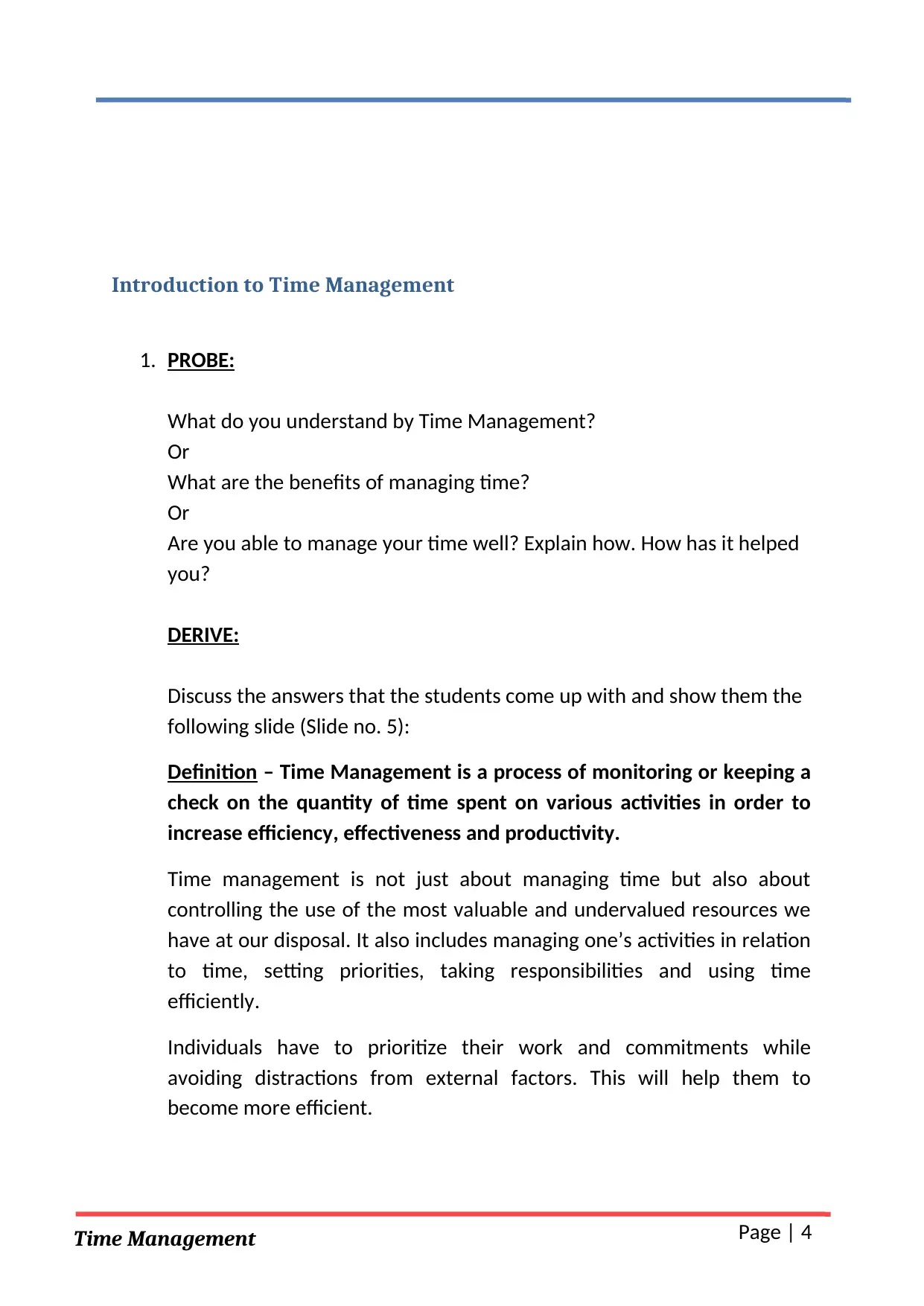
Time Management
Introduction to Time Management
1. PROBE:
What do you understand by Time Management?
Or
What are the benefits of managing time?
Or
Are you able to manage your time well? Explain how. How has it helped
you?
DERIVE:
Discuss the answers that the students come up with and show them the
following slide (Slide no. 5):
Definition – Time Management is a process of monitoring or keeping a
check on the quantity of time spent on various activities in order to
increase efficiency, effectiveness and productivity.
Time management is not just about managing time but also about
controlling the use of the most valuable and undervalued resources we
have at our disposal. It also includes managing one’s activities in relation
to time, setting priorities, taking responsibilities and using time
efficiently.
Individuals have to prioritize their work and commitments while
avoiding distractions from external factors. This will help them to
become more efficient.
Page | 4
Introduction to Time Management
1. PROBE:
What do you understand by Time Management?
Or
What are the benefits of managing time?
Or
Are you able to manage your time well? Explain how. How has it helped
you?
DERIVE:
Discuss the answers that the students come up with and show them the
following slide (Slide no. 5):
Definition – Time Management is a process of monitoring or keeping a
check on the quantity of time spent on various activities in order to
increase efficiency, effectiveness and productivity.
Time management is not just about managing time but also about
controlling the use of the most valuable and undervalued resources we
have at our disposal. It also includes managing one’s activities in relation
to time, setting priorities, taking responsibilities and using time
efficiently.
Individuals have to prioritize their work and commitments while
avoiding distractions from external factors. This will help them to
become more efficient.
Page | 4
Paraphrase This Document
Need a fresh take? Get an instant paraphrase of this document with our AI Paraphraser
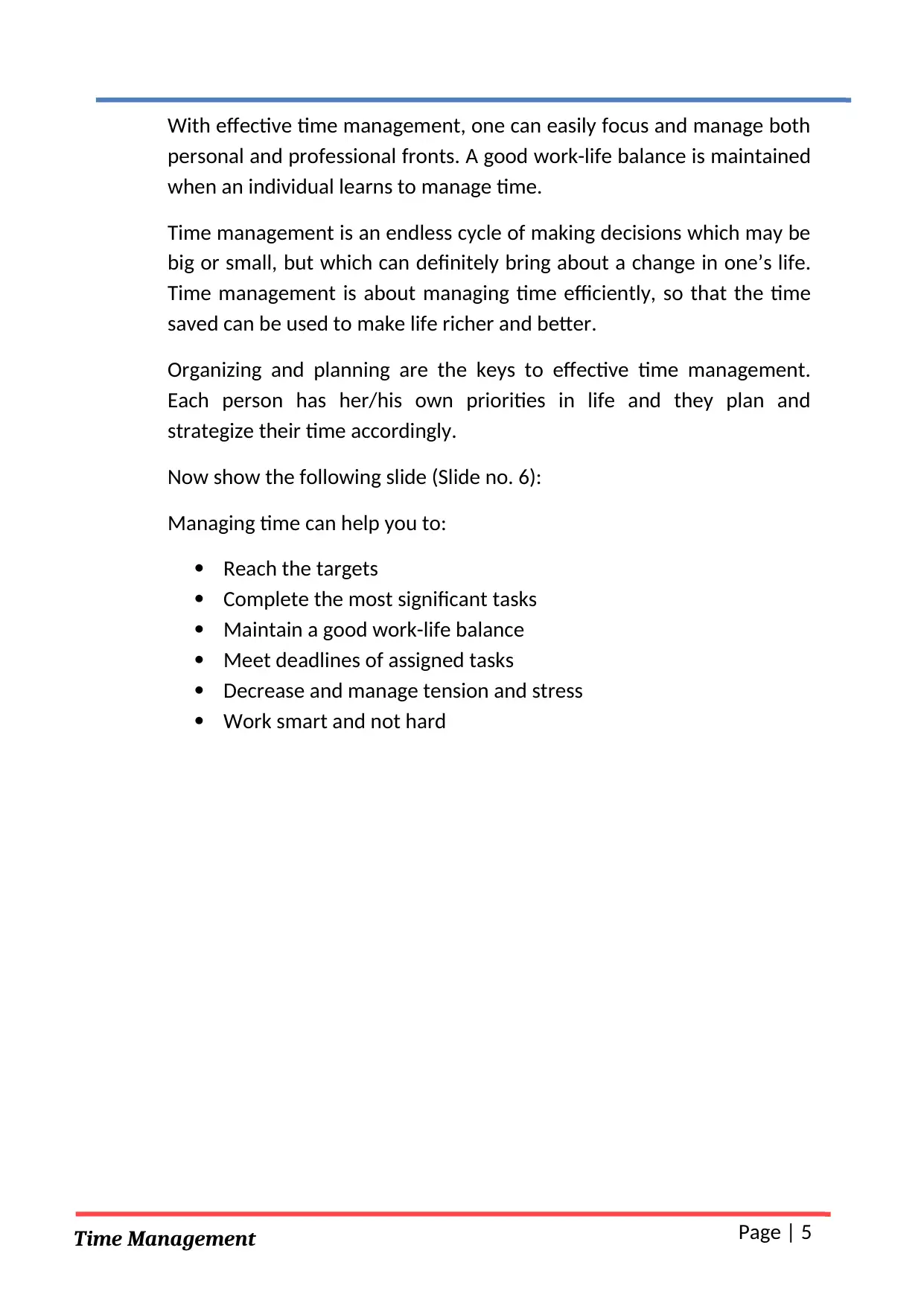
Time Management
With effective time management, one can easily focus and manage both
personal and professional fronts. A good work-life balance is maintained
when an individual learns to manage time.
Time management is an endless cycle of making decisions which may be
big or small, but which can definitely bring about a change in one’s life.
Time management is about managing time efficiently, so that the time
saved can be used to make life richer and better.
Organizing and planning are the keys to effective time management.
Each person has her/his own priorities in life and they plan and
strategize their time accordingly.
Now show the following slide (Slide no. 6):
Managing time can help you to:
Reach the targets
Complete the most significant tasks
Maintain a good work-life balance
Meet deadlines of assigned tasks
Decrease and manage tension and stress
Work smart and not hard
Page | 5
With effective time management, one can easily focus and manage both
personal and professional fronts. A good work-life balance is maintained
when an individual learns to manage time.
Time management is an endless cycle of making decisions which may be
big or small, but which can definitely bring about a change in one’s life.
Time management is about managing time efficiently, so that the time
saved can be used to make life richer and better.
Organizing and planning are the keys to effective time management.
Each person has her/his own priorities in life and they plan and
strategize their time accordingly.
Now show the following slide (Slide no. 6):
Managing time can help you to:
Reach the targets
Complete the most significant tasks
Maintain a good work-life balance
Meet deadlines of assigned tasks
Decrease and manage tension and stress
Work smart and not hard
Page | 5
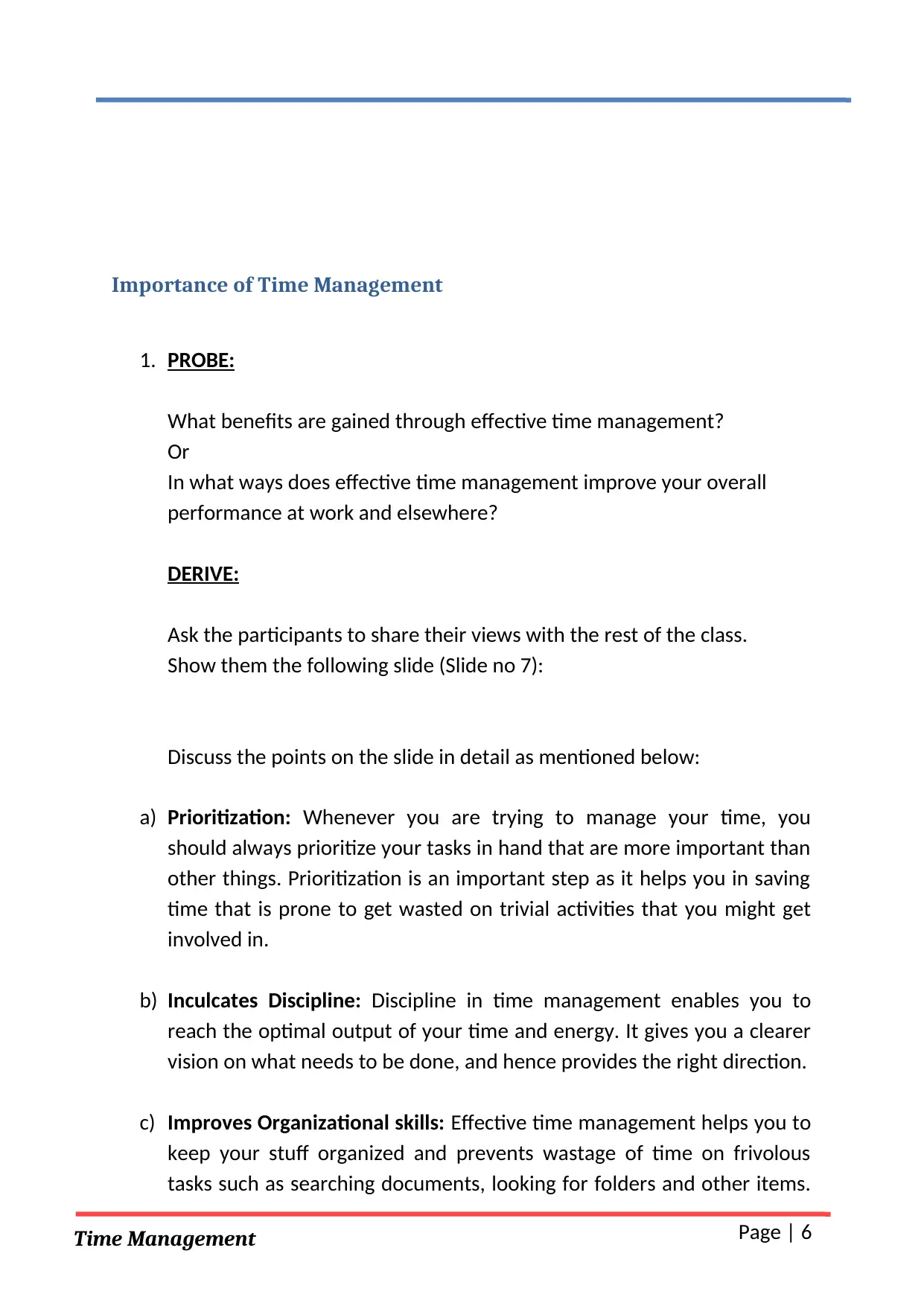
Time Management
Importance of Time Management
1. PROBE:
What benefits are gained through effective time management?
Or
In what ways does effective time management improve your overall
performance at work and elsewhere?
DERIVE:
Ask the participants to share their views with the rest of the class.
Show them the following slide (Slide no 7):
Discuss the points on the slide in detail as mentioned below:
a) Prioritization: Whenever you are trying to manage your time, you
should always prioritize your tasks in hand that are more important than
other things. Prioritization is an important step as it helps you in saving
time that is prone to get wasted on trivial activities that you might get
involved in.
b) Inculcates Discipline: Discipline in time management enables you to
reach the optimal output of your time and energy. It gives you a clearer
vision on what needs to be done, and hence provides the right direction.
c) Improves Organizational skills: Effective time management helps you to
keep your stuff organized and prevents wastage of time on frivolous
tasks such as searching documents, looking for folders and other items.
Page | 6
Importance of Time Management
1. PROBE:
What benefits are gained through effective time management?
Or
In what ways does effective time management improve your overall
performance at work and elsewhere?
DERIVE:
Ask the participants to share their views with the rest of the class.
Show them the following slide (Slide no 7):
Discuss the points on the slide in detail as mentioned below:
a) Prioritization: Whenever you are trying to manage your time, you
should always prioritize your tasks in hand that are more important than
other things. Prioritization is an important step as it helps you in saving
time that is prone to get wasted on trivial activities that you might get
involved in.
b) Inculcates Discipline: Discipline in time management enables you to
reach the optimal output of your time and energy. It gives you a clearer
vision on what needs to be done, and hence provides the right direction.
c) Improves Organizational skills: Effective time management helps you to
keep your stuff organized and prevents wastage of time on frivolous
tasks such as searching documents, looking for folders and other items.
Page | 6
⊘ This is a preview!⊘
Do you want full access?
Subscribe today to unlock all pages.

Trusted by 1+ million students worldwide
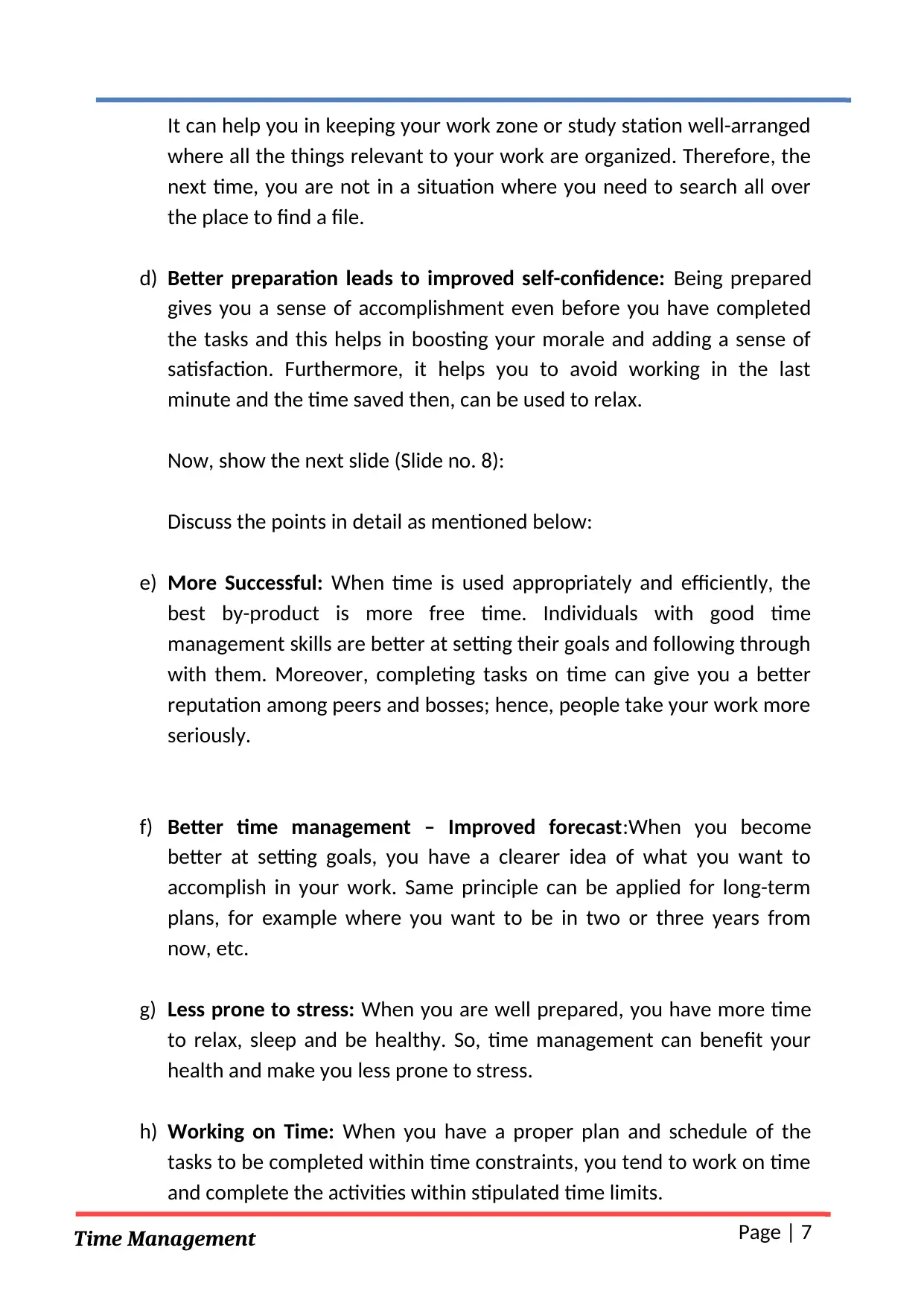
Time Management
It can help you in keeping your work zone or study station well-arranged
where all the things relevant to your work are organized. Therefore, the
next time, you are not in a situation where you need to search all over
the place to find a file.
d) Better preparation leads to improved self-confidence: Being prepared
gives you a sense of accomplishment even before you have completed
the tasks and this helps in boosting your morale and adding a sense of
satisfaction. Furthermore, it helps you to avoid working in the last
minute and the time saved then, can be used to relax.
Now, show the next slide (Slide no. 8):
Discuss the points in detail as mentioned below:
e) More Successful: When time is used appropriately and efficiently, the
best by-product is more free time. Individuals with good time
management skills are better at setting their goals and following through
with them. Moreover, completing tasks on time can give you a better
reputation among peers and bosses; hence, people take your work more
seriously.
f) Better time management – Improved forecast:When you become
better at setting goals, you have a clearer idea of what you want to
accomplish in your work. Same principle can be applied for long-term
plans, for example where you want to be in two or three years from
now, etc.
g) Less prone to stress: When you are well prepared, you have more time
to relax, sleep and be healthy. So, time management can benefit your
health and make you less prone to stress.
h) Working on Time: When you have a proper plan and schedule of the
tasks to be completed within time constraints, you tend to work on time
and complete the activities within stipulated time limits.
Page | 7
It can help you in keeping your work zone or study station well-arranged
where all the things relevant to your work are organized. Therefore, the
next time, you are not in a situation where you need to search all over
the place to find a file.
d) Better preparation leads to improved self-confidence: Being prepared
gives you a sense of accomplishment even before you have completed
the tasks and this helps in boosting your morale and adding a sense of
satisfaction. Furthermore, it helps you to avoid working in the last
minute and the time saved then, can be used to relax.
Now, show the next slide (Slide no. 8):
Discuss the points in detail as mentioned below:
e) More Successful: When time is used appropriately and efficiently, the
best by-product is more free time. Individuals with good time
management skills are better at setting their goals and following through
with them. Moreover, completing tasks on time can give you a better
reputation among peers and bosses; hence, people take your work more
seriously.
f) Better time management – Improved forecast:When you become
better at setting goals, you have a clearer idea of what you want to
accomplish in your work. Same principle can be applied for long-term
plans, for example where you want to be in two or three years from
now, etc.
g) Less prone to stress: When you are well prepared, you have more time
to relax, sleep and be healthy. So, time management can benefit your
health and make you less prone to stress.
h) Working on Time: When you have a proper plan and schedule of the
tasks to be completed within time constraints, you tend to work on time
and complete the activities within stipulated time limits.
Page | 7
Paraphrase This Document
Need a fresh take? Get an instant paraphrase of this document with our AI Paraphraser
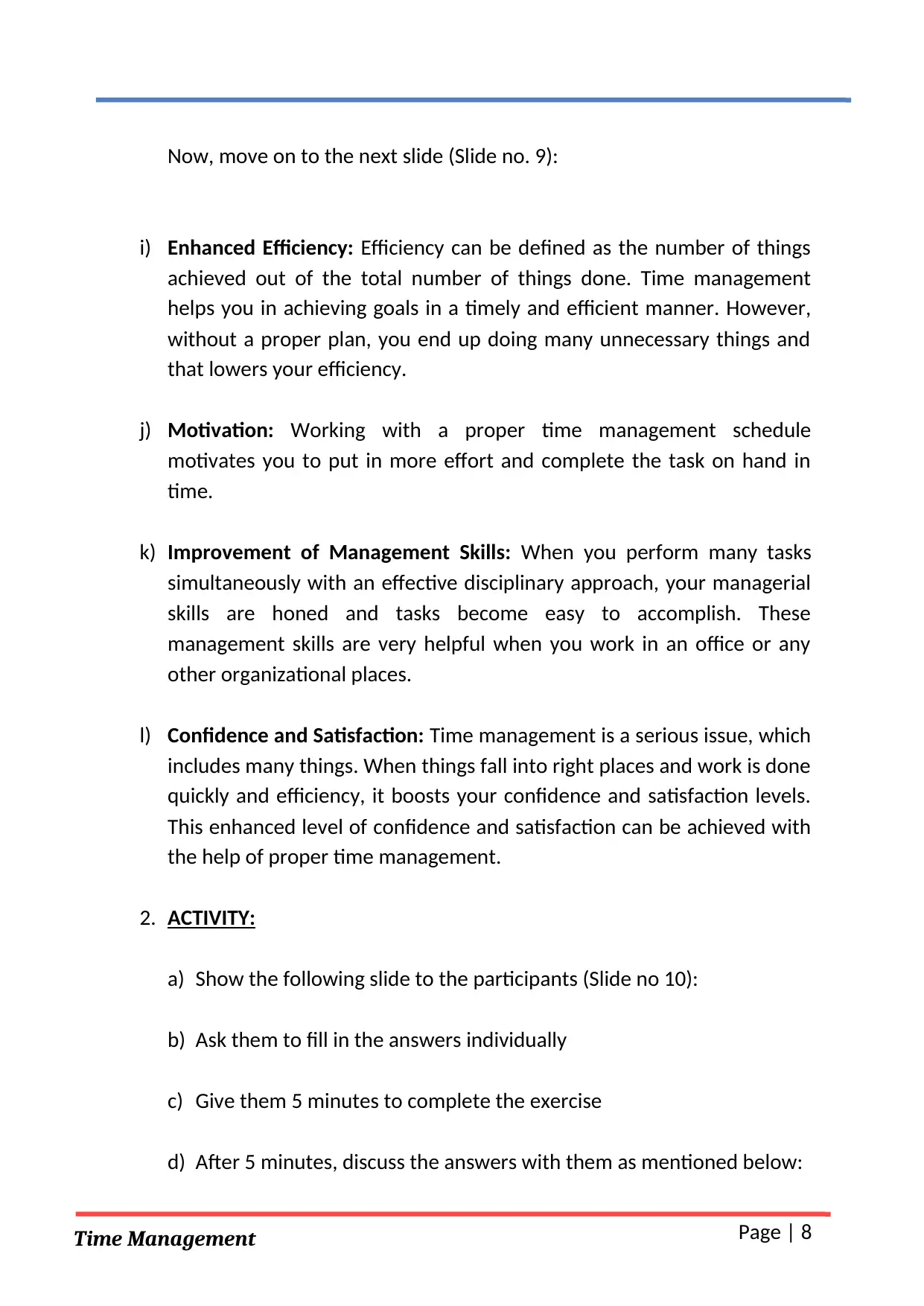
Time Management
Now, move on to the next slide (Slide no. 9):
i) Enhanced Efficiency: Efficiency can be defined as the number of things
achieved out of the total number of things done. Time management
helps you in achieving goals in a timely and efficient manner. However,
without a proper plan, you end up doing many unnecessary things and
that lowers your efficiency.
j) Motivation: Working with a proper time management schedule
motivates you to put in more effort and complete the task on hand in
time.
k) Improvement of Management Skills: When you perform many tasks
simultaneously with an effective disciplinary approach, your managerial
skills are honed and tasks become easy to accomplish. These
management skills are very helpful when you work in an office or any
other organizational places.
l) Confidence and Satisfaction: Time management is a serious issue, which
includes many things. When things fall into right places and work is done
quickly and efficiency, it boosts your confidence and satisfaction levels.
This enhanced level of confidence and satisfaction can be achieved with
the help of proper time management.
2. ACTIVITY:
a) Show the following slide to the participants (Slide no 10):
b) Ask them to fill in the answers individually
c) Give them 5 minutes to complete the exercise
d) After 5 minutes, discuss the answers with them as mentioned below:
Page | 8
Now, move on to the next slide (Slide no. 9):
i) Enhanced Efficiency: Efficiency can be defined as the number of things
achieved out of the total number of things done. Time management
helps you in achieving goals in a timely and efficient manner. However,
without a proper plan, you end up doing many unnecessary things and
that lowers your efficiency.
j) Motivation: Working with a proper time management schedule
motivates you to put in more effort and complete the task on hand in
time.
k) Improvement of Management Skills: When you perform many tasks
simultaneously with an effective disciplinary approach, your managerial
skills are honed and tasks become easy to accomplish. These
management skills are very helpful when you work in an office or any
other organizational places.
l) Confidence and Satisfaction: Time management is a serious issue, which
includes many things. When things fall into right places and work is done
quickly and efficiency, it boosts your confidence and satisfaction levels.
This enhanced level of confidence and satisfaction can be achieved with
the help of proper time management.
2. ACTIVITY:
a) Show the following slide to the participants (Slide no 10):
b) Ask them to fill in the answers individually
c) Give them 5 minutes to complete the exercise
d) After 5 minutes, discuss the answers with them as mentioned below:
Page | 8
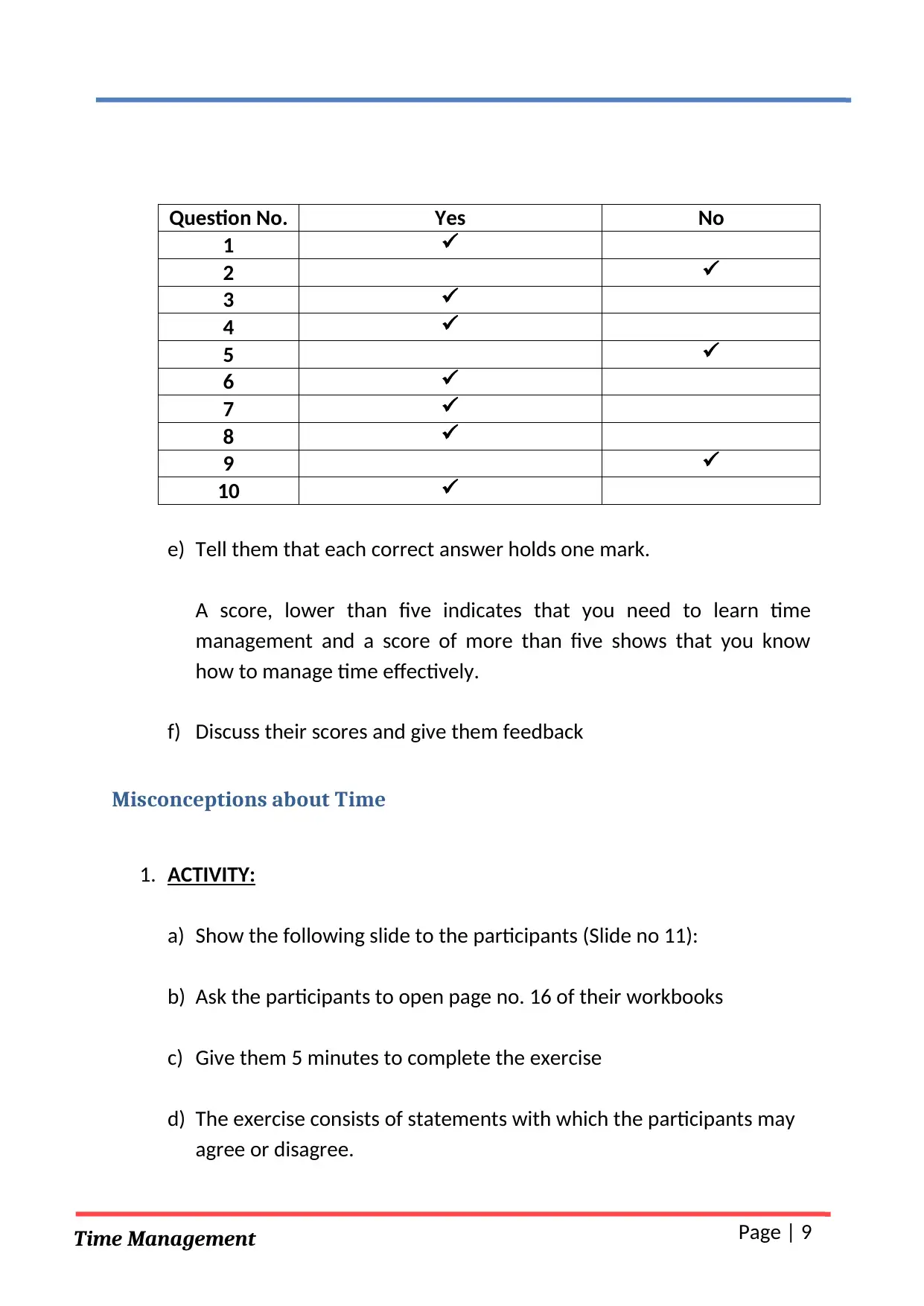
Time Management
Question No. Yes No
1
2
3
4
5
6
7
8
9
10
e) Tell them that each correct answer holds one mark.
A score, lower than five indicates that you need to learn time
management and a score of more than five shows that you know
how to manage time effectively.
f) Discuss their scores and give them feedback
Misconceptions about Time
1. ACTIVITY:
a) Show the following slide to the participants (Slide no 11):
b) Ask the participants to open page no. 16 of their workbooks
c) Give them 5 minutes to complete the exercise
d) The exercise consists of statements with which the participants may
agree or disagree.
Page | 9
Question No. Yes No
1
2
3
4
5
6
7
8
9
10
e) Tell them that each correct answer holds one mark.
A score, lower than five indicates that you need to learn time
management and a score of more than five shows that you know
how to manage time effectively.
f) Discuss their scores and give them feedback
Misconceptions about Time
1. ACTIVITY:
a) Show the following slide to the participants (Slide no 11):
b) Ask the participants to open page no. 16 of their workbooks
c) Give them 5 minutes to complete the exercise
d) The exercise consists of statements with which the participants may
agree or disagree.
Page | 9
⊘ This is a preview!⊘
Do you want full access?
Subscribe today to unlock all pages.

Trusted by 1+ million students worldwide
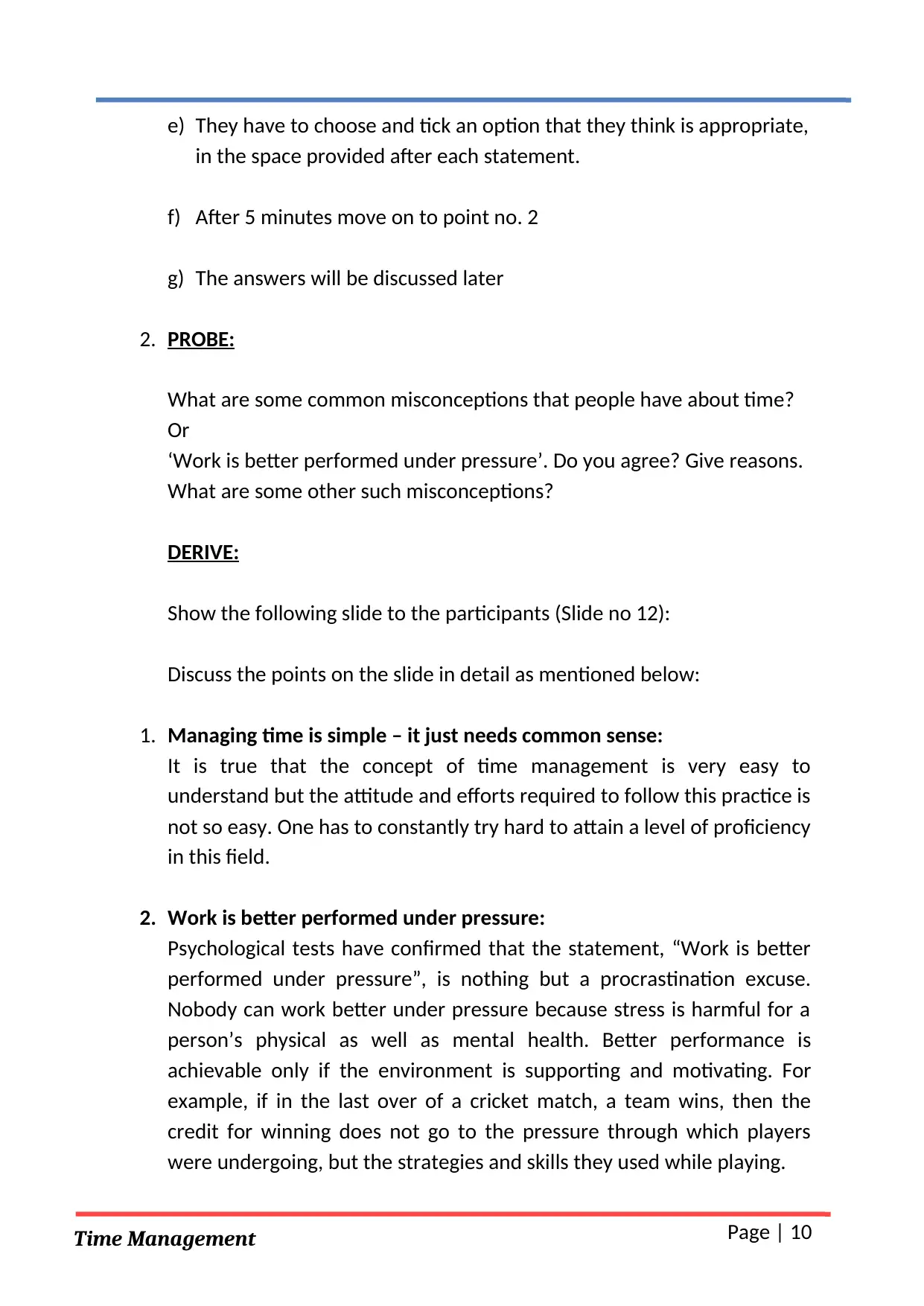
Time Management
e) They have to choose and tick an option that they think is appropriate,
in the space provided after each statement.
f) After 5 minutes move on to point no. 2
g) The answers will be discussed later
2. PROBE:
What are some common misconceptions that people have about time?
Or
‘Work is better performed under pressure’. Do you agree? Give reasons.
What are some other such misconceptions?
DERIVE:
Show the following slide to the participants (Slide no 12):
Discuss the points on the slide in detail as mentioned below:
1. Managing time is simple – it just needs common sense:
It is true that the concept of time management is very easy to
understand but the attitude and efforts required to follow this practice is
not so easy. One has to constantly try hard to attain a level of proficiency
in this field.
2. Work is better performed under pressure:
Psychological tests have confirmed that the statement, “Work is better
performed under pressure”, is nothing but a procrastination excuse.
Nobody can work better under pressure because stress is harmful for a
person’s physical as well as mental health. Better performance is
achievable only if the environment is supporting and motivating. For
example, if in the last over of a cricket match, a team wins, then the
credit for winning does not go to the pressure through which players
were undergoing, but the strategies and skills they used while playing.
Page | 10
e) They have to choose and tick an option that they think is appropriate,
in the space provided after each statement.
f) After 5 minutes move on to point no. 2
g) The answers will be discussed later
2. PROBE:
What are some common misconceptions that people have about time?
Or
‘Work is better performed under pressure’. Do you agree? Give reasons.
What are some other such misconceptions?
DERIVE:
Show the following slide to the participants (Slide no 12):
Discuss the points on the slide in detail as mentioned below:
1. Managing time is simple – it just needs common sense:
It is true that the concept of time management is very easy to
understand but the attitude and efforts required to follow this practice is
not so easy. One has to constantly try hard to attain a level of proficiency
in this field.
2. Work is better performed under pressure:
Psychological tests have confirmed that the statement, “Work is better
performed under pressure”, is nothing but a procrastination excuse.
Nobody can work better under pressure because stress is harmful for a
person’s physical as well as mental health. Better performance is
achievable only if the environment is supporting and motivating. For
example, if in the last over of a cricket match, a team wins, then the
credit for winning does not go to the pressure through which players
were undergoing, but the strategies and skills they used while playing.
Page | 10
Paraphrase This Document
Need a fresh take? Get an instant paraphrase of this document with our AI Paraphraser
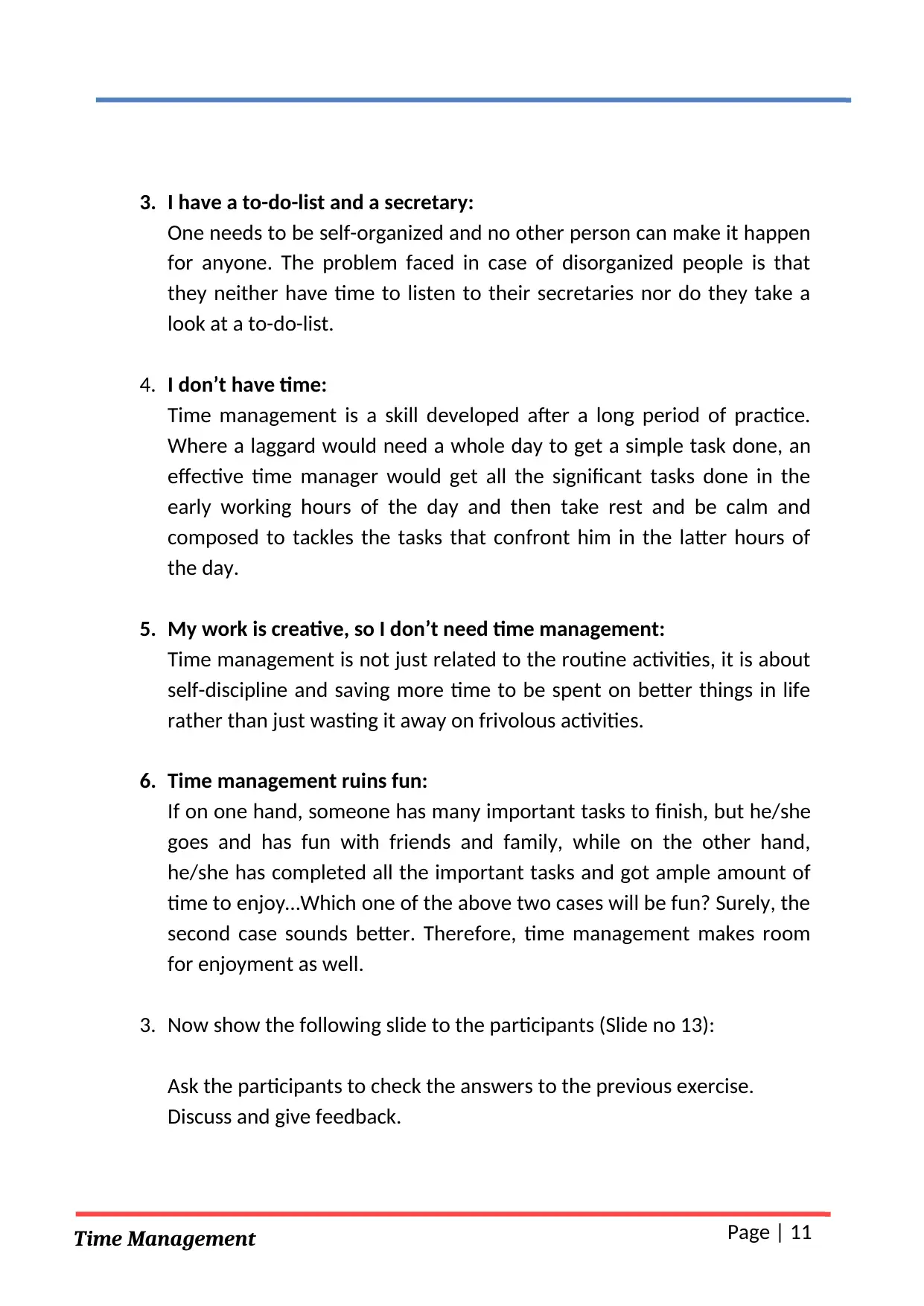
Time Management
3. I have a to-do-list and a secretary:
One needs to be self-organized and no other person can make it happen
for anyone. The problem faced in case of disorganized people is that
they neither have time to listen to their secretaries nor do they take a
look at a to-do-list.
4. I don’t have time:
Time management is a skill developed after a long period of practice.
Where a laggard would need a whole day to get a simple task done, an
effective time manager would get all the significant tasks done in the
early working hours of the day and then take rest and be calm and
composed to tackles the tasks that confront him in the latter hours of
the day.
5. My work is creative, so I don’t need time management:
Time management is not just related to the routine activities, it is about
self-discipline and saving more time to be spent on better things in life
rather than just wasting it away on frivolous activities.
6. Time management ruins fun:
If on one hand, someone has many important tasks to finish, but he/she
goes and has fun with friends and family, while on the other hand,
he/she has completed all the important tasks and got ample amount of
time to enjoy…Which one of the above two cases will be fun? Surely, the
second case sounds better. Therefore, time management makes room
for enjoyment as well.
3. Now show the following slide to the participants (Slide no 13):
Ask the participants to check the answers to the previous exercise.
Discuss and give feedback.
Page | 11
3. I have a to-do-list and a secretary:
One needs to be self-organized and no other person can make it happen
for anyone. The problem faced in case of disorganized people is that
they neither have time to listen to their secretaries nor do they take a
look at a to-do-list.
4. I don’t have time:
Time management is a skill developed after a long period of practice.
Where a laggard would need a whole day to get a simple task done, an
effective time manager would get all the significant tasks done in the
early working hours of the day and then take rest and be calm and
composed to tackles the tasks that confront him in the latter hours of
the day.
5. My work is creative, so I don’t need time management:
Time management is not just related to the routine activities, it is about
self-discipline and saving more time to be spent on better things in life
rather than just wasting it away on frivolous activities.
6. Time management ruins fun:
If on one hand, someone has many important tasks to finish, but he/she
goes and has fun with friends and family, while on the other hand,
he/she has completed all the important tasks and got ample amount of
time to enjoy…Which one of the above two cases will be fun? Surely, the
second case sounds better. Therefore, time management makes room
for enjoyment as well.
3. Now show the following slide to the participants (Slide no 13):
Ask the participants to check the answers to the previous exercise.
Discuss and give feedback.
Page | 11
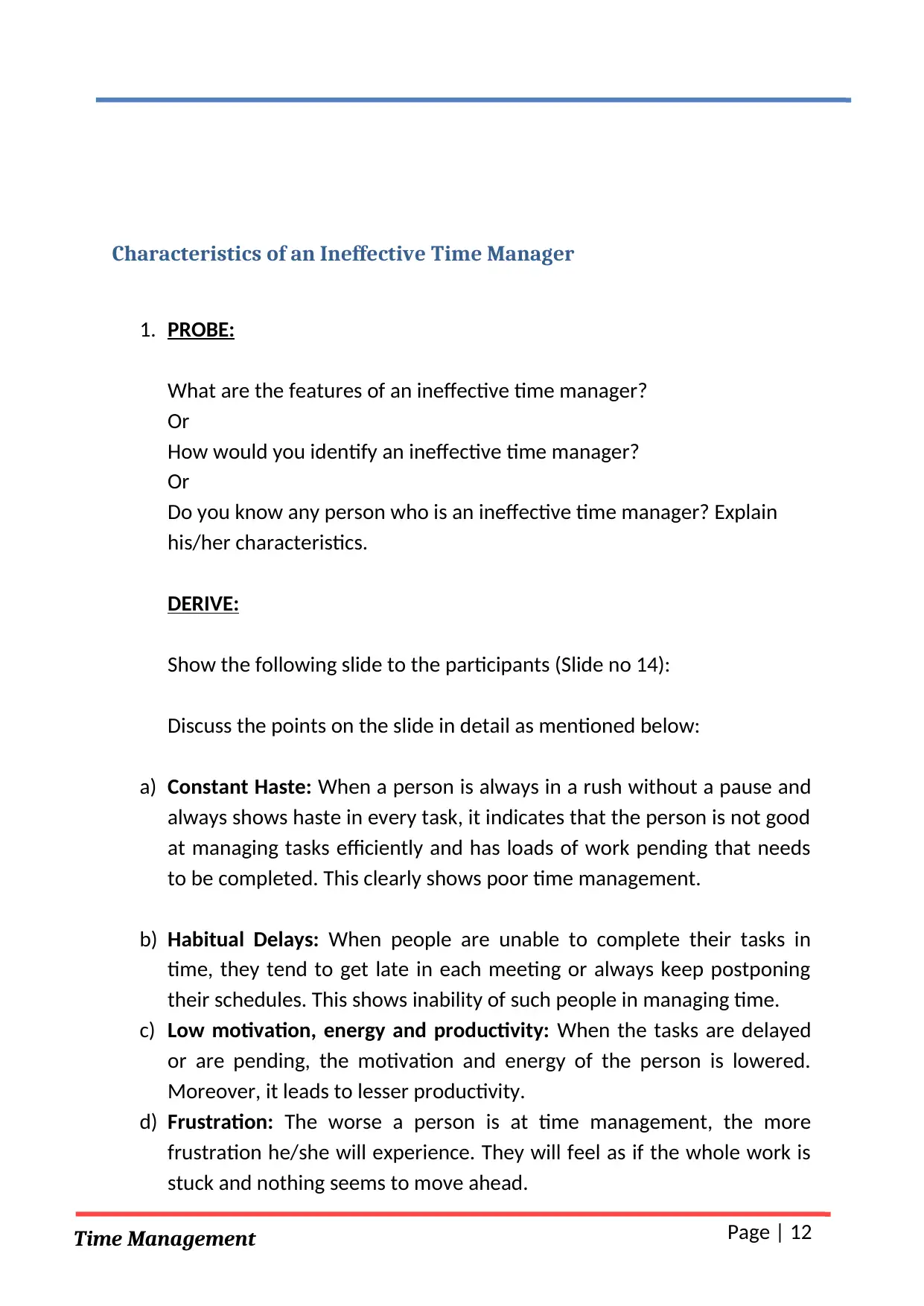
Time Management
Characteristics of an Ineffective Time Manager
1. PROBE:
What are the features of an ineffective time manager?
Or
How would you identify an ineffective time manager?
Or
Do you know any person who is an ineffective time manager? Explain
his/her characteristics.
DERIVE:
Show the following slide to the participants (Slide no 14):
Discuss the points on the slide in detail as mentioned below:
a) Constant Haste: When a person is always in a rush without a pause and
always shows haste in every task, it indicates that the person is not good
at managing tasks efficiently and has loads of work pending that needs
to be completed. This clearly shows poor time management.
b) Habitual Delays: When people are unable to complete their tasks in
time, they tend to get late in each meeting or always keep postponing
their schedules. This shows inability of such people in managing time.
c) Low motivation, energy and productivity: When the tasks are delayed
or are pending, the motivation and energy of the person is lowered.
Moreover, it leads to lesser productivity.
d) Frustration: The worse a person is at time management, the more
frustration he/she will experience. They will feel as if the whole work is
stuck and nothing seems to move ahead.
Page | 12
Characteristics of an Ineffective Time Manager
1. PROBE:
What are the features of an ineffective time manager?
Or
How would you identify an ineffective time manager?
Or
Do you know any person who is an ineffective time manager? Explain
his/her characteristics.
DERIVE:
Show the following slide to the participants (Slide no 14):
Discuss the points on the slide in detail as mentioned below:
a) Constant Haste: When a person is always in a rush without a pause and
always shows haste in every task, it indicates that the person is not good
at managing tasks efficiently and has loads of work pending that needs
to be completed. This clearly shows poor time management.
b) Habitual Delays: When people are unable to complete their tasks in
time, they tend to get late in each meeting or always keep postponing
their schedules. This shows inability of such people in managing time.
c) Low motivation, energy and productivity: When the tasks are delayed
or are pending, the motivation and energy of the person is lowered.
Moreover, it leads to lesser productivity.
d) Frustration: The worse a person is at time management, the more
frustration he/she will experience. They will feel as if the whole work is
stuck and nothing seems to move ahead.
Page | 12
⊘ This is a preview!⊘
Do you want full access?
Subscribe today to unlock all pages.

Trusted by 1+ million students worldwide
1 out of 34
Related Documents
Your All-in-One AI-Powered Toolkit for Academic Success.
+13062052269
info@desklib.com
Available 24*7 on WhatsApp / Email
![[object Object]](/_next/static/media/star-bottom.7253800d.svg)
Unlock your academic potential
Copyright © 2020–2026 A2Z Services. All Rights Reserved. Developed and managed by ZUCOL.




